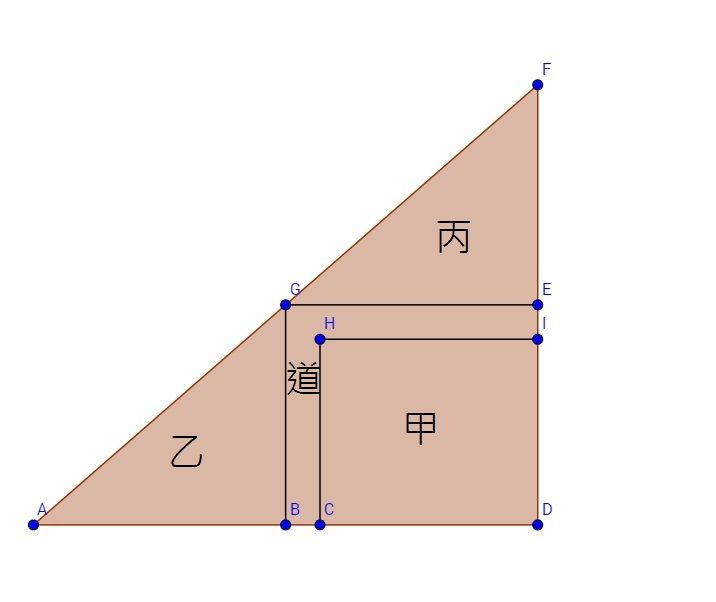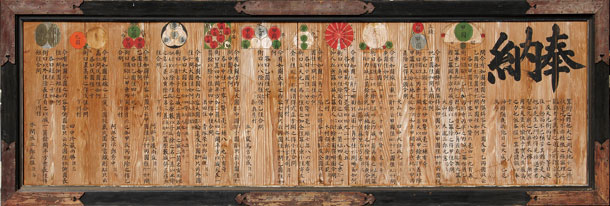Math story #3 - The Sangaku in Japanese Temples/ 數學故事 #3 - 日本寺廟的繪馬算額
In ancient times Japanese would donate horses to the temples or shrines for good favor. However, over time this was transferred to a wooden plaque with a picture of a horse due to economic considerations. And the object of drawing is gradually extended from the horses to different kinds of thing, which is so-called "Ema" (絵馬/えま/picture-horse). You can write the prayer of various wishes, as well as the name and address on the back of the Ema.
早期, 日本人自古視馬為神明的坐騎 , 所以會獻上馬匹給 寺廟 或 神社 祈願 ,但由於 經濟上的考慮, 出現用土製或木製的馬偶代替活馬來進行祭祀。 而所畫的對象也逐漸由馬匹延伸到他種物件,這就是現今所謂的「繪馬」( 絵馬/えま/Ema) 。在繪馬的背面,可以寫上祈求人的心願,以及他們的姓名和住所。
Japanese mathematics (和算/わさん/wasan) denotes a distinct kind of mathematics which was developed in Japan during the Edo Period (江戸時代/え ど じ だ い/Edo jidai )(1603–1867). The mathematics research and education activities were basically carried out in private schools, temples. The mathematician are generally lower-level bushi (ぶし ) (japanese warrior) or farmers.
到了日本江戸時代(えどじだい/Edo jidai)(1603~1867 年) , 和算(わさん/Wasan)屬於民間性學術, 數學研究與教育活動基本上是在民間私塾、 寺廟中進行的, 和算家一般都是下層武士或比較富裕的農民。 「 和算 」 即是日本本土數學, 由數學家關孝和發展起來的一種數學。其深受中國算學影響,成就包括一些很優秀的行列式和微積分的成果。 「 和算 」 是一門如同圍棋、茶道的技藝。和算家之間也會對弈。
There was no steemit, no internet, and even no computer. The temple or the shrine was the best place for people to communicate at the time. And the mathematician will own research results (usually carefully designed questions), made of tablet hanging in the shrine. This kind of tablet is called "Sangaku" (算額/さ ん が く ), so the Sangaku was the mathematical style Ema.
古代沒有電腦,沒有網絡,更沒有steemit 。 寺廟 或 神社 是當時人們 學術 交流 的一個最佳場所 。 和算 家將自己的研究成果(通常是精心設計的考題) , 做成匾額掛在神社。 這種還願的 書板就叫做「算額」(さんがく/Sangaku),因此,算額可以說就是數學風貌的繪馬。
The Sangaku hung in the precincts of temples as offerings to the god, as challenges to the congregants, or as displays of the solutions to questions. The mathematician will visit the shrine when visiting a new place.
掛在神社的算額,一方面是奉獻給神明的貢品,一方面是對和算教師的敬意,還有讓其他和算家見識自己的數學造詣。和算家每到一個新地方必定會參拜神社,順便解題。
There were more geometric problems than algebra problems on the Sangaku. Because the geometry contains beautiful circle or polygons, and is more attractive. As the typical problem, it was mainly about the length or circle diameter, also contains some straight line, triangle, inscribed circle and circumference problem etc.. The difficulty is equivalent to secondary school or university.
在算額上所書寫,幾何問 題多於代數問題。 因為幾何圖形包含了 美麗的圓形或多邊形,而顯得更有吸引 力。至於典型的算額問題,則是求邊長或 者圓的直徑,其中當然也包含了直線、三 角形、內切圓和圓周長等問題 , 難度相當於現今中學到大學一二年級。
Below, let us appreciate some of the mathematical problems in the Sangaku.
以下,就 讓我們欣賞一些算額中的數學題目。

飯田市鼎町 一色神社
安政2年(1855)7月 斎藤定保門人後藤左平多保信 奉納
"今有如圖鉤股地,甲、乙、丙、曲全 道容。只言鉤九十六間,股百十間,四積 等分,問道巾幾何? 答曰:十五間。"
Problem:
There is a big right-angle triangle with a height of 96 and 110 at the base, with an L-shaped road with equal width.
The area of rectangle A"i.e.甲" and B"i.e.乙", C"i.e.丙" and the L-shaped road "i.e.道" are equal,
what the road width (i.e. IE/BC)?
Answer: 15.
所謂「間」,是日 本 所用的長度單位,
問題:有一個直角三角形,高為96 間(古代 日 本 所用的長度單位) ,底為 110間,
內含一條寬度相等的 L 型的道路如圖所示,
已知矩形甲與乙、丙 兩三角形及道路這四個部分面積都相等,
問道路寬為何?
答案:15 間。
.jpg)
As shown in the figure,
due to the area of the triangle ABG (ie "B""乙") = area of the triangle EGF (ie "C""丙") = 1/2 of the area of the rectangular BDEG (ie "A""甲" + "Road""道").
DE=EF=96/2 = 48, AB = BD = 110/2 = 55,
Let x be the width of the road "道" (= BC = EI),
then (48)(55)/2= (48-x)(55-x),
i.e. x ^ 2 - 103x + 1320 = 0,
∴ x = 15 or 88 (rejected, x cannot greater than 48)
如圖所示,由於三角形 ABG ( 即" 乙")的面積=三角形 EGF (即" 丙")的面積=1/2 矩形 BDEG(即"甲"+"道") 的面積。 DE=EF=96/2 = 48, AB = BD = 110/2 = 55,
設"道"寬為 x (= BC = EI ),
則 (48)(55)/2= (48-x)(55-x) ,
整理可得方程式 x^2 - 103x + 1320 = 0 ,
∴ x=15 或88( 不 合,x最大為48 )

Kitano Tenmangu,Kyoto/京都 市北野天滿宮 (1686)
One of the earliest Sangaku was found in Kitano Tenmangu,Kyoto (京都 市北野天満宮) (1686). the total amount of existing Sangaku is around 900 pieces. The Sangaku is also a mathematical, historical, artistic cultural heritage. Some Japanese schools began to use the Sangaku as teaching material, so that students can learn a lot of knowledge. These Sangaku are now being digitized (URL: http://www.wasan.jp/).
現存最早的算額是 木縣佐野市星宮神社天和三年 (1683) 奉納的算額, 其次分別是京都 市北野天滿宮 (1686)。 日本全國幾乎所有地區 都出現過算額, 現存算額總數大約達到900餘面。 算額是同時具備數學、歷史、藝術的珍貴文化遺產,某些日本中學開始以算額為跨領域教材,讓學生能完整學習到眾多知識。 這些算額現都逐步被電子化(網址為: 和算の館 http://www.wasan.jp/)。
Math story #1 - Han Xin Counting Soldiers (韓信點兵) (Remainder problem)
https://steemit.com/chainbb-general/@binbin88/math-story-1-han-xin-counting-soldiers-remainder-problem-2017614t17355932z
數學故事#1 - 韓信點兵(剩餘問題)
https://steemit.com/cn/@binbin88/1-2017623t162736633z
Math story #2 - Thales and the Great Pyramid of Cheops
https://steemit.com/chainbb-general/@binbin88/math-story-2-thales-and-the-great-pyramid-of-cheops-2017619t17393476z


interesting! one more fun while travel Japan shrine :P
Yes! It is about mathematical, historical, artistic.
Thanks. I'd like to include this in the next mathematics magazine (N.4 can be found here). Hope that's OK with you.
!-=o0o=-!
To follow curated math content follow @math-trail.
If you wish @math-trail to follow you then read this article.
Click here for Mathematics forum on chainBB
Thank you sir! OK!
Just taking this opportunity to say "THANK YOU FOR FOLLOWING ME"
Congratulations @binbin88! You have received a personal award!
Click on the badge to view your Board of Honor.
Congratulations @binbin88! You received a personal award!
You can view your badges on your Steem Board and compare to others on the Steem Ranking
Vote for @Steemitboard as a witness to get one more award and increased upvotes!
Very helpful post.. Thanks for sharing.. Keep it up sir..
Thanks for the support!